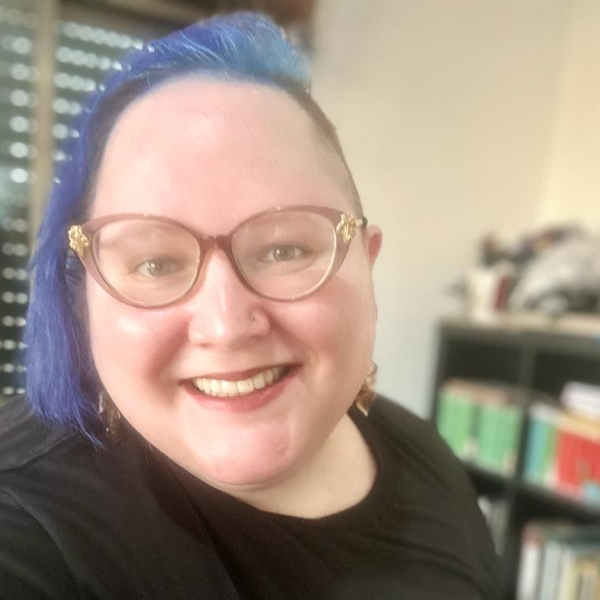Interviews with Olim
Each month, we interview an oleh or olah for our newsletter.
We invite you to read the stories of LGBTQ+ people who have made Israel their home.
"Israel is incredibly important to me and the only place I’ve ever felt at home"
Interview date: December 2023
Q. Where were you born and where did you grow up?
A. I was born and grew up in Iowa.
Q. At what age did you come out? And how did it go?
A. There was no official discussion. I started seeing girls when I was about 16 but I knew long before that. I dislike formal coming out conversations, mainly because I feel like straight people don’t have to announce they’re straight. There’s added burden on all queer people to announce things to people and it’s never sat well with me. And it’s necessary to do it so many times in your life if that’s your approach, per se. It’s exhausting, especially as a neurodivergent person (in my own experience; not assuming anyone else’s). If the subject comes up, I usually mention I’m gay/lesbian, or sometimes I need to correct someone’s assumptions of default heterosexuality. I did have a formal coming out conversation with one of my sisters, and her reaction was lovely and supportive, but I still disliked the concept so much that I just didn’t do any others. It felt like an inauthentic, manufactured discussion to me. That’s not to say that coming out conversations are inauthentic for others; just for me and the way my brain processes things. So I live day by day, as sincerely as I can. That’s the best I can do.
Q. Were you involved at all in the LGBT community in your previous country?
A. I was in a few groups over the years, though I’m very introverted and that can affect my participation in communities. But I’ve made a few lifelong friends from these groups and that’s the most important thing to me.
Q. What is your involvement (if any) in the LGBT community in Israel?
A. I’m not heavily active, though I’ve made some great friends here over the years from queer groups. I always try to join a few.
Q. How long since you made Aliyah?
A. Ten years.
Q. Did you move here on your own or with family/friends/significant other?
A. I moved by myself with two bags of luggage, about USD50, and nothing else in the world. The first couple months I had no mattress and slept on a blanket in my apartment. It was a year before I bought a bed base. Thankfully, I got a stable job and things have improved since then. But it was an experience.
Q. Why did you make Aliyah?
A. I feel that there is nowhere more suitable in the world for a Jewish person than in Israel. There’s a part of my soul that is never whole except when I am here. Israel is incredibly important to me and the only place I’ve ever felt at home.
Q. How is it going so far?
A. Best decision I ever made.
Q. What do you do in terms of work?
A. I am a technical writer for a software company. I learn software before it has instructions and I write those instructions. My role also includes UX writing. I review and create text for software pop-ups, section headers, descriptions of features, and every other instance of text in the app.
Q. How is your Ivrit?
A. I’m probably on par with a reasonably bright three-year-old. I understand about 70% of what I hear and I can speak about half of what I want to say. It gets easier every year. I never went to ulpan because I urgently needed to start working immediately (see above re: no mattress for two months). So everything I know is from real-life scenarios. When you have to learn something, you learn it. Depending on the subject, I may understand 50-90%.
Q. What has been your biggest challenge so far?
A. Definitely the Hebrew acquisition. Sometimes it’s a nightmare, not understanding everything and making really bad mistakes. And sometimes it’s fine. You learn to compromise and settle for something other than expected. You learn not to care as much about getting what you wanted or being able to convey exactly what you feel. I’m a writer so this was a struggle to adjust to, because I am always able to communicate what I want in English, sometimes even with eloquence. But I’m always learning more Hebrew and as said, it gets easier every year.
Q. How do you perceive the Israeli LGBT community?
A. It’s different from the American LGBTQ+ community because the people in it are different. Israelis are very different from Americans. I count myself on the Israeli side more than American these days; I’ve lived here a full half my adult life. The discussions in communities seem more intimate in Israel and the problems are sometimes at different stakes than in the States, where life is… I don’t want to say easier, but it’s certainly less complex sometimes for the queer community there than here.
Q. How is being LGBT in Israel different to your where you lived previously?
A. I feel less comfortable sometimes here talking about queerness/gayness/whateverness, depending on the person. The majority of religious people here (and I count myself one) are accepting but you never know when you’ll encounter someone who is wildly against it. Some feel fine about being deeply homophobic and cracking awful jokes. It makes me feel… not always safe to open up. And that makes me uncomfortable. Thankfully, I’ve only had a couple negative experiences. The majority I’ve talked to about it have been accepting and some are very supportive.
Q. If you were making aliyah now, would you do anything differently?
A. I would learn about a zillion times more Hebrew.
Suzanne

Our Newsletter
Sign up if you would like to receive a monthly email listing events of interest to LGBT English-speakers in Israel, an interview with an oleh/olah and other useful information.
Want to be interviewed?
Complete the form below and we will get back to you.
Our Newsletter
Sign up if you would like to receive a monthly email listing events of interest to LGBT English-speakers in Israel, an interview with an oleh/olah and other useful information.
Want to be interviewed?
Complete the form below and we will get back to you.


